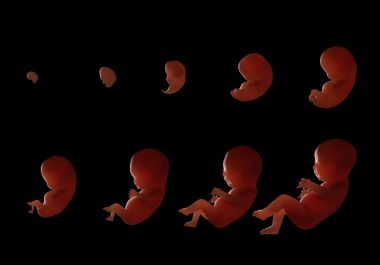A response to some of the familiar arguments in favour of abortion

While my observations on the overturning of the Roe v Wade 1973 Supreme Court ruling generated many supportive comments, they also triggered some unpleasant and ill-tempered replies. I was blamed for what I said, what I didn't say and, surprisingly, what people imagined I did (or didn't) say.
Now I must admit that my attempt to comment on a big subject in a short blog was probably unwise and I plead guilty to the sin of omission. Nevertheless, I remain unrepentant over my horror of what we can call the normalisation of 'industrial scale abortion' and my joy in the overturning of the Supreme Court ruling that allowed it in the USA. (In 2020 there were 930,160 abortions in the USA and 290,917 abortions in England and Wales.)
What I was struck by in the hostile responses was the return of many old familiar arguments for a position of almost unregulated abortion. Let me briefly address some of these.
1) 'A foetus is no more than a lump of cells.'
In fact much more is now known about the life of the unborn child and I urge you to find out more about the miniature being that already exists after two months of pregnancy. (This website explains human development in the womb.) In view of the fact that the ending of brainwaves is taken as an indicator of death, it is worth noting that increasingly complex brainwave activity occurs from the second month of pregnancy. Moreover, the heartbeat can be detected from just 3 weeks and 1 day! The baby in the womb truly is 'fearfully and wonderfully made' (Psalm 139:14).
2) 'Removal of a foetus is no different from the elimination of a gall stone or an appendix.'
I believe that the seriousness of abortion is more widely sensed in the general public than is commonly claimed. Few people take any pride or pleasure in abortion. I've seen photos and even test tubes of people's removed gall stones. No one treats the 'eliminated foetus' that way.
3) 'Because the foetus has no independent, autonomous existence it cannot be considered to be living or to have rights.'
Here I surely need only to mention the fact that no newborn infant has any independent autonomy for many months or even years. There's not a lot of difference between being fed from the breast or through an umbilical cord.
4) 'Abortion must be necessary to save the life of the mother.'
Medical friends tell me such occasions are almost unknown. Consider the Dublin Declaration, written and signed by a select panel of the Committee on Excellence in Maternal Healthcare. And in any event, such cases have little bearing on the vast majority of abortions (to the nearest whole number, 0% of UK abortions fall into this category according to the official statistics [see 4.7]).
5) 'Abortion has to be allowable in the case of rape or incest.'
Of course these are appalling situations which raise challenging and very individual legal and pastoral concerns. However, we need to consider that abortion may in fact add to the trauma. One of my friends was the result of her mother's rape and she is a remarkable woman and church leader. Think of it this way: if we wouldn't put a newborn baby to death because of the crime of their father, why would we put the same baby to death a few weeks earlier, when he or she is still in the womb? Is it our location or age that grants us a right to life?
6) 'The discovery of life-threatening conditions in the unborn demands an abortion.'
Again such situations are uncommon - 1.5% of abortions in England and Wales in 2020 were due to a 'substantial risk that if the child were born it would suffer from such physical or mental abnormalities as to be seriously handicapped' [source: 4.7].
Personally, I regularly meet with people with a range of disabilities and I can't remember anyone saying, 'I wish I'd been aborted.' In an age when all those with disability are, quite correctly, treated with respect and support, I think we need to honour the greatest of all rights: the right to live.
But there is more to be said here. We have developed a culture in which we celebrate physical perfection and babies are aborted because they fail to meet the standards of our age. As Christians we must challenge that. Equally, too, we must realise that children with additional needs who are carried to full term have implications for individuals, churches and societies.
Surely every pregnancy must be a supported pregnancy? That support may be in financial terms, or in a guarantee of adoption. It may be costly and it may well be long term. Consider the case of an unborn baby with a genetic defect that will require lifelong support. In the UK that support is, at least in theory, guaranteed by the Health Service. But in the States any parent(s) would face crippling costs. That burden must be underwritten.
Words can be cheap; we need to be prepared to match them with action lest we fall foul of the warning of James 2:16: 'If one of you says . . . "Go, I wish you well; keep warm and well fed," but does nothing about his physical needs, what good is it?'
Abortion poses hard questions and demands honest answers. May God grant us wisdom and grace to respond rightly.
My friend Dave Brennan directs a ministry called Brephos, helping churches and Christians to respond to abortion. His website is full of helpful teaching resources, and his new podcast, About Abortion, is well worth listening to.
Here is my interview with Dave on Facing the Canon.
Canon J.John is the Director of Philo Trust. Visit his website at www.canonjjohn.com or follow him on Facebook, Instagram or Twitter.











